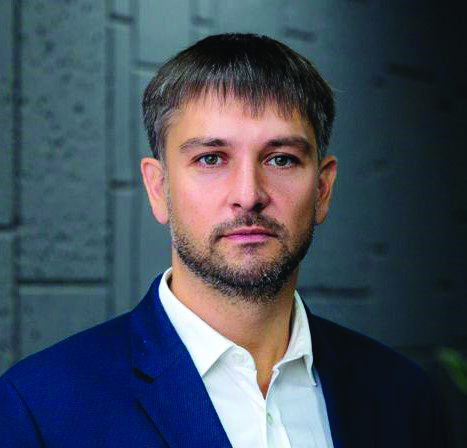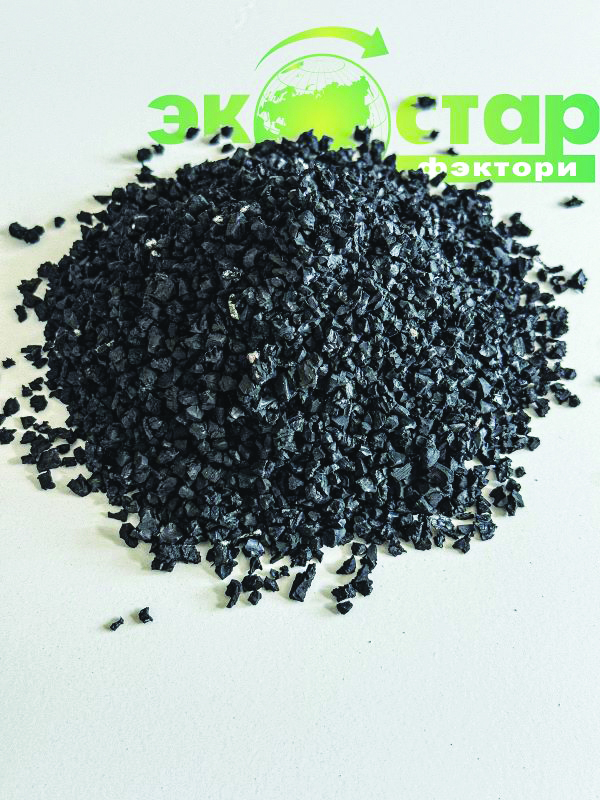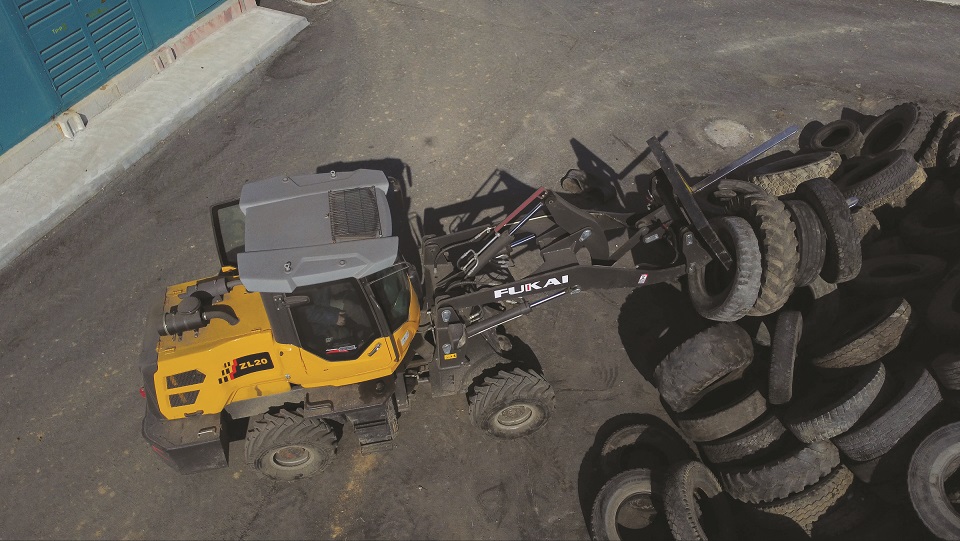- Ecostar
- Russia
- Sergei Lazarev
- Vladivostok
- Far East and Arctic Development Corporation
- tyre
- recycling
- recover
Demand For Tyre Recycling Growing In Russian Far East: Ecostar Factory
- By Gaurav Nandi
- January 10, 2025

Russia's tyre recycling industry has grown significantly in recent years due to increasing environmental concerns and government regulations aimed at reducing landfill waste. The country generates millions of tonnes of used tyres annually, with many initiatives focusing on recycling them into rubber granules, fuel and construction materials. Key players in the industry include local companies and a few foreign investments with major recycling plants concentrated around Moscow and other industrial regions.
However, the Russian Far Eastern region, referred to the vast, easternmost part of the country that borders the Pacific Ocean, still struggles to deal with the disposing of end-of-life (EOL) tyres.
 According to Ecostar Factory Co-founder Sergei Lazarev, “Vladivostok, the largest city in Russia's Far East, ranks fifth in the country for vehicles per capita, making it the region's leader in vehicle density. This results in a growing volume of waste tyres annually, posing a significant environmental challenge. Due to the vast distances, transporting used tyres to recycling facilities in central Russia is prohibitively expensive, inflating both the recycling costs and the prices of products made from recycled materials. The lack of local recycling infrastructure exacerbates the problem, underscoring the need for regional solutions to manage tyre waste more efficiently and sustainably.”
According to Ecostar Factory Co-founder Sergei Lazarev, “Vladivostok, the largest city in Russia's Far East, ranks fifth in the country for vehicles per capita, making it the region's leader in vehicle density. This results in a growing volume of waste tyres annually, posing a significant environmental challenge. Due to the vast distances, transporting used tyres to recycling facilities in central Russia is prohibitively expensive, inflating both the recycling costs and the prices of products made from recycled materials. The lack of local recycling infrastructure exacerbates the problem, underscoring the need for regional solutions to manage tyre waste more efficiently and sustainably.”
“With 15 years of experience in tyre recycling, our company is well-positioned to meet the growing demand for tyre recycling in the Russian Far East. The new facility will allow us to recycle over 10,000 tonnes of ELT annually and meet market needs accurately. We also plan to double this capacity within the next five years, which is especially crucial in regions like the Russian Far East, where transportation costs are high and local recycling infrastructure is lacking. This expansion will help address regional tyre waste challenges more effectively,” he added.
 A total of USD 500,000 was invested in the new tyre recycling unit, financed through a mix of 30 percent capital and 70 percent bank loans. The seven percent interest rate, subsidised by the Primorye Government Guarantee Fund and the Federal Government Fund for SMEs, highlights the strategic backing you’ve received. Specialising in recycling ELT tyres into rubber crumb, this setup not only aligns with growing sustainability efforts but also demonstrates the effectiveness of public-private cooperation in fostering business expansion and environmental impact in Russia’s Far East.
A total of USD 500,000 was invested in the new tyre recycling unit, financed through a mix of 30 percent capital and 70 percent bank loans. The seven percent interest rate, subsidised by the Primorye Government Guarantee Fund and the Federal Government Fund for SMEs, highlights the strategic backing you’ve received. Specialising in recycling ELT tyres into rubber crumb, this setup not only aligns with growing sustainability efforts but also demonstrates the effectiveness of public-private cooperation in fostering business expansion and environmental impact in Russia’s Far East.
The Far East and Arctic Development Corporation (FEDC) played a crucial role in the tyre recycling project’s success by providing a 17.3-acre land lot and essential infrastructure. This included telecommunications, access roads, power supply, water supply, water disposal and natural gas supply. Additionally, FEDC offered tax benefits, making it a key partner in the project’s development, facilitating smoother operations and reducing overhead costs. This comprehensive support has been instrumental in advancing the project in the Russian Far East.
Promoting recycling
The company's operations, which focus on recycling ELT tyres without thermal methods like pyrolysis due to environmental concerns, were nearly derailed when the ruble-dollar exchange rate doubled in 2022, making equipment and construction prohibitively expensive.
Despite purchasing Chinese machinery, adjustments were needed due to differences in tyre composition, particularly the amount of cord fibre. The company plans to recycle 20 years’ worth of accumulated tyre waste and supply crumb rubber to playgrounds, stadiums and road projects, boasting the only facility in the region certified to meet government sanitary standards.
With no direct competitors in the Primorye region, the company remains committed to expanding operations despite these challenges.
Answering how the new plant supports broader recycling goals, Lazarev said, “The new plant supports the broader goals of the company by serving as a central hub for tyre recycling in the Russian Far East. We operate facilities in five regions including Magadan, Kamchatka, Sakhalin, Khabarovsk and Primorye and plan to upgrade them within the next three years to produce rubber chips, which will be transported to the main facility in Primorye for further processing. Additionally, we aim to invest in research and development to develop additives for bitumen, enhancing its use in road construction projects. This strategy is key to expanding recycling capabilities beyond 10,000 tonnes annually and promoting sustainable infrastructure development.”
The company will source tyre waste primarily from transportation and tyre service companies. To ensure quality, it has implemented a comprehensive management system designed to produce clean, precisely sized crumb rubber. The triple cleaning process removes metal and cord fibre, while its proprietary qualification system ensures four specific size fractions of crumb rubber are achieved.
Alluding to European Union (EU) directive on crumb rubber infill ban, he noted, “Regarding the EU ban on rubber crumb in artificial turf, Russia has no such restrictions. In fact, a recent Russian government act (08/28/2024) mandates the use of rubber crumb in sports infrastructure and road construction. We have also obtained a special health certificate allowing the use of its crumb rubber in outdoor playground construction.”
Addressing challenges
Russia imports tyres primarily from China, which is the largest supplier, offering a wide range of products including passenger, truck and industrial tyres. South Korea follows, known for its high-quality passenger and performance tyres, while Japan contributes advanced technology and speciality tyres. Belarus, as a neighbouring country, exports various tyre products, particularly for commercial vehicles. Turkey has also been increasing its market presence with competitive prices and quality. Additionally, some European Union countries export tyres to Russia, although trade dynamics are influenced by tariffs and geopolitical factors.

Such a wide array of tyres poses challenge for recyclers. Commenting on the same, the executive said, “The plant was initially scheduled to open in August 2023. The company faced significant challenges due to currency fluctuations, infrastructure delays and regulatory hurdles. Despite purchasing Chinese machinery, adjustments were needed due to differences in tyre composition between China and Japan, particularly the amount of cord fibre. The lack of suitable land with the necessary infrastructure and meeting strict ecological standards are further obstacles.”
“We are currently facing a staff shortage across all skill levels, from low-skilled to highly qualified personnel. To address this, we plan to recruit workers from other regions of Russia and internationally. Recently, we hired five individuals from India on one-year contracts, providing them with comprehensive benefits that include accommodation, food, transportation and work uniforms. We aim to attract even more skilled workers this year to strengthen our team,” he added.
Ecostar's plant aligns seamlessly with Russia's broader waste management and environmental objectives, particularly in the Far East. It supports the government's strategy for a circular economy, which is reinforced by new legislation regulating the use of recycled materials in the production of goods and services. Additionally, the government has introduced the concept of ‘green purchases’, mandating that government agencies and state-owned companies procure a minimum quantity of products made from recycled materials. This initiative emphasises the importance of integrating recycled materials into the economy, enhancing sustainability efforts across the region.
Discount Tire Earns Spot On Glassdoor's Best Places To Work 2026 List
- By TT News
- February 04, 2026

Discount Tire has earned a prominent position on Glassdoor's Best Places To Work 2026 list, ranking 14th in Consumer Services and within the top 100 US employers. This distinction is awarded to organisations with over 1,000 employee reviews on Glassdoor and a minimum rating of 3.5. For the Scottsdale-based retailer, with more than 1,250 locations nationally, the honour underscores a long-standing commitment to its workforce.
The company cultivates a people-first culture for its over 30,000 employees by providing substantial career growth, thorough training, leadership development and competitive benefits. This philosophy, centred on serving others and empowering personal goals, previously earned Discount Tire top Glassdoor rankings from 2018 through 2021. The latest recognition reaffirms its status as an employer dedicated to fostering a supportive and progressive workplace.
Dean Muglia, Chief Executive Officer, said, "We treat our people like family. We're honoured to be recognised by both current and former employees and Glassdoor as a best place to work. We strive every day to deliver the most inviting, easy and safe experience possible for our people and our customers."
Michael Zuieback, Executive Chairman, said, "Through six and a half decades of growth, our primary commitments have stayed true: We want to take care of people and help make more dreams come true.”
Radar Tyres Secures Strategic Multi-Year Partnership With Cricket South Africa
- By TT News
- February 04, 2026

Radar Tyres has entered a significant, multi-year global partnership with Cricket South Africa, a strategic move to build its brand within a sport enjoyed by a worldwide audience. This alliance grants the company headline sponsorship for the Proteas Men’s and Women’s T20 International sides, alongside associate partnership status for their ODI and Test matches. Radar will also be the headline partner for South Africa’s Under-19 national teams.
The collaboration provides substantial visibility, featuring exclusive logo placement on both match and training kits, with the new T20I apparel already unveiled. For Radar, this investment is a key step in leveraging high-profile platforms to enhance global brand recognition, all while maintaining its commitment to providing high-quality, value-driven tyre products.
G S Sareen, President and CEO, Omni United, said, "Becoming the Global Partner of the Proteas marks a significant milestone in Radar Tyres' global brand journey and reflects our belief in sport as a powerful platform to build brand equity, strengthen dealer support, enhance trust and credibility and connect with households worldwide. Through this partnership, we are able to engage with cricket fans both locally and globally while reinforcing Radar Tyres' as a reliable, performance-driven brand committed to delivering premium-performance at an accessible price point."
Pholetsi Moseki, Chief Executive Officer, CSA, said, "CSA is extremely proud to partner with Radar Tyres, an organisation that shares our values and commitment to excellence. This partnership is a significant milestone, securing support not only for our senior teams but for our junior teams as well. This partnership reflects our deliberate approach to working with like-minded organisations, guided by a long-term vision of developing the game, supporting our players and delivering memorable experiences for fans. Radar Tyres' support also reinforces CSA's commitment to excellence and inclusion, strengthening our ability to drive high performance across all levels."
AZuR Shortlisted For German Award For Sustainability Projects 2026
- By TT News
- February 03, 2026

For the second consecutive year, the Alliance for the Future of Tyres (AZuR) has been shortlisted for the German Award for Sustainability Projects, following its 2025 win. This renewed nomination underscores the jury’s recognition of AZuR as a pioneering force in sustainability, particularly for its dedicated efforts to advance tyre retreading as a core component of a circular economy. The 2026 award ceremony will be held under the patronage of Brigitte Zypries on 17 September in Berlin.
AZuR’s multifaceted initiative extends well beyond theoretical advocacy. Its work gained significant international attention with the Retreading Summit, held in September 2025 at KRONE Trailer in Werlte. This event convened experts from industry, politics, academia and media for two days of intensive dialogue on the potential, challenges and necessary policy frameworks for tyre modernisation, leading to the launch of concrete action plans. Furthermore, the alliance drives progress through strategic communications and direct support for flagship projects, such as the new passenger car tyre retreading facility established by Rigdon in Pfaffenhofen.
Central to AZuR’s mission is transforming public perception by demonstrating that worn tyres are valuable resources, not waste. Through ongoing awareness campaigns, it highlights the substantial ecological and economic benefits of retreaded tyres, which can be refurbished multiple times to conserve raw materials, reduce climate impact and offer cost-effective solutions. The German Award for Sustainability Projects, judged by a panel chaired by Prof Dr Claudia Kemfert of DIW Berlin, evaluates entries based on their innovation, impact and relevance to a sustainable future. AZuR’s repeated shortlisting affirms that its model for a tyre circular economy is a replicable and exemplary system with groundbreaking potential.
- Manish Maharaj
- Balkrishna Industries Ltd
- BKT Tyres
- Apollo Tyres Ltd
- Tyre Industry
- Business Finance Leadership
Manish Maharaj Joins BKT Tyres as GM & Head of Business Finance
- By Sharad Matade
- February 02, 2026

Seasoned tyre industry executive Manish Maharaj has embarked on a new professional chapter, joining Balkrishna Industries Ltd (BKT Tires) in a senior leadership capacity after a distinguished 11-year tenure with Apollo Tyres Ltd.
In his new role at BKT Tires, Maharaj has been appointed General Manager and Head of Business Finance, where he will focus on enhancing financial strategy, driving performance-driven growth, and building scalable systems to support BKT’s global expansion ambitions.
“I am thrilled to begin a new chapter with BKT Tires,” said Maharaj.
Maharaj’s career at Apollo spanned multiple strategic roles in one of the world’s leading tyre manufacturers, most recently serving as Regional Chief Financial Officer for South East Asia, the Middle East and Africa, and later as Business Head for South East Asia. In these capacities, he led multi-market commercial and financial operations, driving robust business performance across diverse cultural and economic environments.
At Apollo, Maharaj was responsible for charting growth strategies in fast-evolving markets, strengthening distributor partnerships, and reinforcing brand positioning across key ASEAN economies. His leadership coincided with initiatives to expand premium brand presence in Thailand, Malaysia, Philippines & South Korea and foster deeper retail engagement across the ASEAN region.







Comments (0)
ADD COMMENT